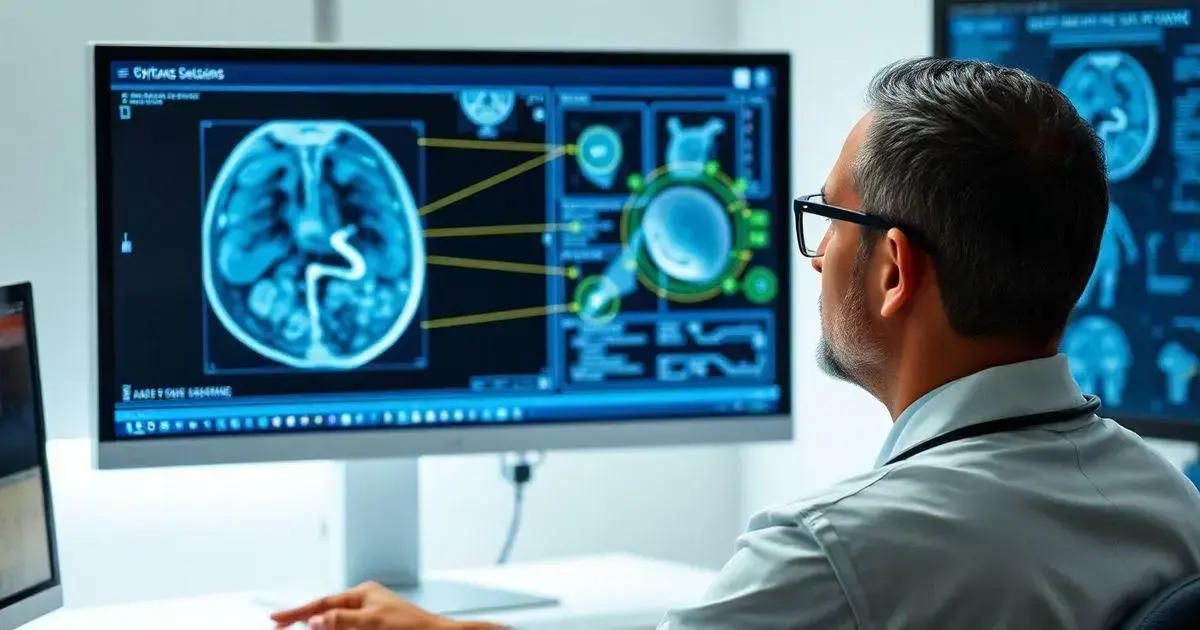Artificial intelligence in medicine is reshaping the healthcare landscape, offering groundbreaking solutions that enhance patient outcomes.
As we dive deeper into this topic, we will reveal how AI technologies are revolutionizing diagnostics, enabling personalized treatments, and addressing challenges in medical practice.
This article aims to illuminate the future of AI in healthcare and its transformative potential.
Understanding Artificial Intelligence in Healthcare
Understanding Artificial Intelligence in Healthcare is essential to appreciate its transformative potential. AI refers to the simulation of human intelligence in machines that are designed to think and act like humans. In healthcare, AI can analyze large sets of data, helping professionals make informed decisions swiftly.
How AI Works in Healthcare
Artificial intelligence utilizes algorithms and software to approximate human cognition in analyzing complex medical data. This capability is particularly useful in reviewing imaging studies, diagnosing diseases, and predicting patient outcomes. By processing vast amounts of data from tests and patient records, AI can highlight key patterns that may be missed by human eyes.
Applications of AI in Healthcare
AI is being employed in multiple areas within healthcare, including radiology and pathology. For example, AI systems can assist radiologists in detecting tumors in imaging scans, potentially increasing the accuracy of diagnoses. Additionally, AI-powered devices can monitor patients’ vital signs in real-time, alerting medical staff to any immediate concerns.
Benefits of AI in Healthcare
The incorporation of AI leads to enhanced efficiency and accuracy in patient care. AI can reduce workload on healthcare providers, allowing them to focus on delivering high-quality care. Furthermore, AI systems can provide tailored recommendations, improving treatment plans that cater to individual patient needs.
The Future of AI in Healthcare
As AI technology evolves, its applications within healthcare will expand further. Researchers are continuously developing new algorithms that may revolutionize predictive analytics, preventive care, and even robotic surgeries. Keeping up with these advancements is crucial for ongoing improvements in patient care.
The Role of AI in Diagnostics

The Role of AI in Diagnostics is crucial for modern healthcare. AI technology assists medical professionals in diagnosing diseases accurately and efficiently. By leveraging complex algorithms, AI systems analyze vast datasets of medical information to identify patterns that may not be easily recognized by humans.
Enhancing Accuracy in Diagnosis
AI systems can enhance accuracy in diagnostics by interpreting medical images, such as X-rays, MRIs, and CT scans. These tools use deep learning techniques to detect anomalies, helping radiologists make precise assessments. As a result, AI can reduce the chances of misdiagnosis or delayed diagnosis.
Speeding Up the Diagnostic Process
With AI, the diagnostic process becomes faster. AI tools can analyze and provide results in real-time, allowing doctors to make quicker decisions. This is especially critical in emergency situations where time is of the essence. Such swift actions can lead to timely interventions and better patient outcomes.
Predictive Analytics in Diagnostics
AI also plays a role in predictive analytics by assessing patient history and risk factors. This capability helps healthcare providers identify patients who may be at higher risk for specific diseases, enabling preventive measures and early treatment. By predicting potential health issues, AI promotes proactive healthcare.
Integrating AI into Clinical Workflows
For AI to be effective in diagnostics, it needs to be integrated seamlessly into existing clinical workflows. Healthcare providers can use AI tools alongside traditional methods, allowing doctors to validate their findings and improve diagnostic accuracy. Training and resources are vital for proper integration.
Real-World Applications of AI in Diagnostics
Many healthcare organizations are utilizing AI in diagnostics. For example, AI algorithms have shown success in identifying diabetic retinopathy from retinal images. Other applications include cancer detection and cardiovascular risk assessment. As technologies evolve, more conditions will likely benefit from these advancements.
AI’s Impact on Personalized Medicine
AI’s Impact on Personalized Medicine is a game-changer in healthcare. Personalized medicine tailors medical treatment to the individual characteristics of each patient. AI enhances this approach by analyzing vast amounts of data to create customized treatment plans.
Data-Driven Insights
With AI, healthcare providers can leverage genomic data, lifestyle choices, and environmental factors to inform treatment decisions. This data-driven strategy helps identify which therapies are most effective for specific patient profiles, leading to improved success rates.
Precision in Treatment Plans
AI systems can recommend precision-based treatment plans. For instance, in oncology, AI algorithms can analyze tumor genetics to suggest targeted therapies that are more likely to work for that specific patient. This leads to better treatment outcomes and reduces trial and error in selecting therapies.
Monitoring Patient Progress
Once treatment begins, AI continues to play a vital role. By monitoring patient responses to therapies in real-time, AI tools can help clinicians adjust treatment plans as needed. This adaptability ensures that patients receive the most effective care throughout their treatment journey.
Reducing Adverse Drug Reactions
AI can significantly reduce the chances of adverse drug reactions by analyzing patient histories and predicting how they will respond to new medications. By identifying potential risks beforehand, healthcare providers can make safer prescribing decisions tailored to each patient.
Future Potential of AI in Personalized Medicine
As AI technology evolves, its impact on personalized medicine will grow even further. Future advancements could lead to more comprehensive health assessments and earlier interventions. The potential for AI to integrate across various aspects of healthcare opens up new horizons for personalized patient care.
Challenges of Implementing AI in Healthcare

Challenges of Implementing AI in Healthcare are numerous and complex. While AI offers many advantages, integrating this technology into existing healthcare systems requires careful consideration.
Data Privacy and Security
One significant challenge is maintaining data privacy and security. Healthcare organizations must protect sensitive patient information from breaches. As AI systems require vast amounts of data, ensuring that personal data is handled securely and ethically is essential.
Integration with Existing Systems
Many healthcare facilities already use established systems for record-keeping and patient management. Integrating AI tools with these existing systems can be difficult and costly. Organizations must ensure that new technologies can work seamlessly with current practices.
Training Healthcare Professionals
Proper training is crucial for successful AI implementation. Healthcare professionals need to understand how AI tools work and how to utilize them effectively. This training can take time and resources, which many organizations may find challenging to allocate.
Resistant to Change
Some healthcare staff may be resistant to adopting new technologies. This resistance can stem from fear of job loss or a lack of understanding of AI benefits. Addressing these concerns through education and communication is vital for successful adoption.
Bias and Accuracy of AI Algorithms
AI algorithms are only as good as the data they are trained on. If the training data is biased or unrepresentative, the AI can produce skewed results, impacting patient care. Continuous monitoring and evaluation of AI systems are needed to ensure accuracy and fairness.
FAQ – Frequently Asked Questions about Artificial Intelligence in Medicine
What is artificial intelligence in medicine?
Artificial intelligence in medicine refers to the use of algorithms and software to analyze complex medical data and assist healthcare professionals in diagnosis, treatment, and patient care.
How does AI improve diagnostics?
AI enhances diagnostics by analyzing medical images and patient data more accurately and quickly than humans, helping to identify diseases and conditions early.
What is personalized medicine, and how does AI contribute to it?
Personalized medicine tailors treatment based on individual patient characteristics, and AI contributes by analyzing patient data to recommend specific therapies that are most effective for them.
What are some challenges of implementing AI in healthcare?
Challenges include data privacy and security concerns, integration with existing systems, the necessity for training healthcare staff, and resistance to change among professionals.
Can AI help with patient monitoring?
Yes, AI can enhance remote patient monitoring by providing real-time data analysis, alerting healthcare providers to significant changes in patient status.
What are some successful case studies of AI in medicine?
Successful case studies include IBM Watson for Oncology, Aidoc for radiology, Zebra Medical Vision for disease detection, and Tempus for personalized treatment strategies.